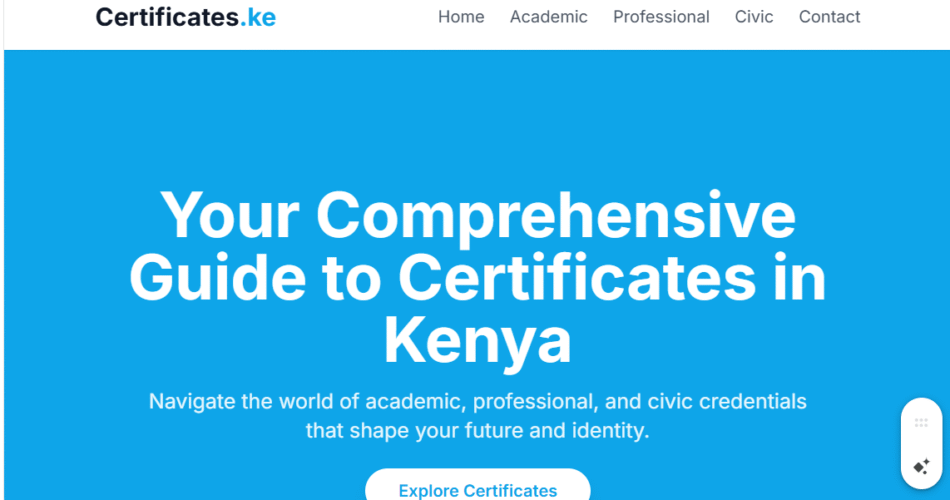SSL Certificates in Kenya:
- Delivery Time2 Weeks
- English levelProfessional
- LocationUSA, United Kingdom, United Arab Emirates, Nairobi, Kilimani, Kenya, Dubai, CBD Nairobi, Canada, Australia
Service Description
The cost of SSL Certificates in Kenya is 8000KES per year.Get Certificates in Kenya at a price of 7500KES per year at Black Shepherd Technologies.
Explore the diverse world of certificates in Kenya. From academic and professional certifications like CPA and PMP to essential civic documents such as birth and police clearance certificates, this comprehensive guide covers popular courses, top institutions, and the process of acquiring these valuable credentials.
In Kenya’s dynamic social, economic, and professional landscape, certificates are more than just pieces of paper; they are essential credentials that open doors to education, employment, and fundamental civic services. The term “certificate” in Kenya can refer to a wide range of official documents, from academic qualifications that validate your skills to critical records that establish your legal identity. This guide provides a detailed overview of the different types of certificates available in Kenya, their significance, and how to acquire them.
1. Academic and Professional Certificates
Academic and professional certificates in Kenya are qualifications awarded by educational institutions and professional bodies to individuals who have completed a course of study or demonstrated competence in a specific field. They are a popular pathway for those who may not meet the entry requirements for a diploma or degree, or for professionals looking to specialize or upskill quickly.
Certificate Courses: These are typically short-term programs that provide foundational knowledge and practical skills for entry-level jobs. They are offered by Technical and Vocational Education and Training (TVET) institutions, colleges, and universities. Common certificate courses in Kenya include:
Business and Management: A Certificate in Business Management provides skills in administration, finance, and operations, making it a gateway to roles in various industries.
Information Technology (IT): With the growing digital economy, IT certificates in areas like Information Communication and Technology (ICT), digital marketing, and cybersecurity are highly sought after.
Hospitality and Tourism: Certificates in this field prepare individuals for careers in hotels, restaurants, and tour companies, covering everything from culinary arts to customer service.
Health and Community Development: These certificates are vital for those seeking to work in healthcare, social work, and non-governmental organizations (NGOs).
Technical and Engineering: Certificates in fields like electrical and electronic engineering, plumbing, and welding are essential for the growing construction and manufacturing sectors.
Professional Certifications: These are credentials awarded by professional bodies, often signifying a high level of expertise and adherence to industry standards. They are critical for career advancement and are highly respected by employers. Some of the most recognized professional certifications in Kenya include:
Certified Public Accountant (CPA): Administered by the Kenya Accountants and Secretaries National Examinations Board (KASNEB), the CPA is the gold standard for accounting professionals.
Project Management Professional (PMP): A globally recognized certification for project managers, demonstrating expertise in leading and directing projects.
Certified Human Resource Professional (CHRP): Offered by the Human Resource Management Professionals Examination Board (HRMPEB), this certification is crucial for a career in human resource management.
Certified Information Systems Auditor (CISA): For IT professionals specializing in auditing, control, and security of information systems.
2. Civic and Government Certificates
Beyond academic and professional qualifications, several government-issued certificates are fundamental for a Kenyan citizen’s legal and civic identity. These documents are required for various life events, from education and employment to travel and inheritance.
Birth Certificate: This is one of the most important identification documents. It establishes a person’s legal identity, age, and nationality. It is a mandatory requirement for registration for national examinations (KCPE and KCSE), obtaining a national identity card, and even for passport applications.
How to obtain: Applications for a birth certificate can be made through the Department of Civil Registration Services, with many services now available on the eCitizen platform.
Kenya Certificate of Primary Education (KCPE) and Kenya Certificate of Secondary Education (KCSE): These are academic certificates awarded by the Kenya National Examinations Council (KNEC) upon successful completion of primary and secondary education, respectively. The KCSE certificate is the primary requirement for admission into tertiary institutions.
Police Clearance Certificate (Certificate of Good Conduct): This certificate is issued by the Directorate of Criminal Investigations (DCI) and confirms that an individual has no criminal record in Kenya. It is a standard requirement for job applications, especially in the government and private sector, and for visa applications to many countries.
Tax Compliance Certificate (TCC): Issued by the Kenya Revenue Authority (KRA), this certificate confirms that an individual or business is compliant with their tax obligations. It is often a prerequisite for tendering for government contracts and other business dealings.
Death Certificate: A legal document issued by the civil registration department that confirms the death of an individual. It is essential for settling estates, claiming insurance benefits, and other legal processes.
3. How to Acquire Certificates in Kenya
The process for acquiring a certificate in Kenya varies depending on its type:
For Academic and Professional Certificates: The first step is to identify a recognized institution or professional body that offers the course. This could be a university, a TVET college, or a professional institute like the Kenya Institute of Management (KIM). Requirements typically include a minimum grade in the KCSE exam, a payment of fees, and successful completion of coursework and examinations. Many institutions now offer flexible learning options, including part-time, distance, and online courses.
For Civic Certificates: The process is largely government-driven, with most services now centralized on the eCitizen platform. Applicants are required to create an account, fill out an application form, pay the required fee, and follow the specified procedures, which may include fingerprinting (for a Police Clearance Certificate) or providing supporting documents (for a Birth Certificate).
In conclusion, certificates in Kenya play a crucial role in validating an individual’s skills, knowledge, and legal standing. Whether it’s a certificate in IT to land a job or a birth certificate to prove one’s identity, these documents are indispensable tools for navigating life and career in the country. Understanding the different types and the processes for obtaining them is key to unlocking opportunities and ensuring compliance with national requirements.








